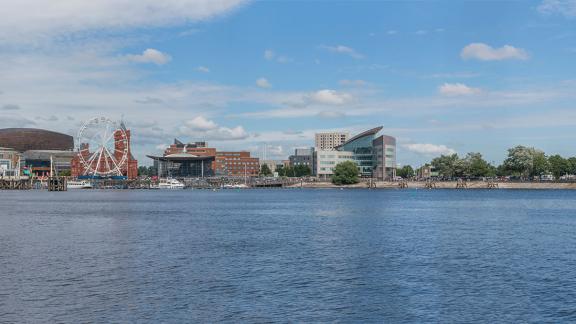Role of Welsh Local Authorities in delivering public services and economic development : Westminster Hall debate

Role of the NHS in economic development
Health, wellbeing and the economy are bound tightly together; a healthy (physically, psychologically and socially) population results in a more economically active population.
In light of COVID-19, the NHS is seeking to reset its services and priorities, with a focus on how it can influence wider community issues in its role as an anchor institution. This includes how its resource allocation and utilisation can support local economic development, influence social and economic determinants of health and help build sustainable communities.
NHS organisations are anchor institutions because they are large organisations whose long-term sustainability is tied to the wellbeing of the population through being one of the largest employers in local areas, a key purchaser of goods and services, and a capital estate holder and developer. However, the socio-economic impacts of NHS Wales spread far beyond its economic scale and scope to include wider impacts, including employment stability, regional wages, occupational structure, and economic activity rates. Collectively, these factors positively impact Welsh productivity and the economy, with organisations and businesses benefitting significantly from healthier and more productive workforces.
Working with Local Authorities
There are a number of ways the NHS in Wales can and does work with Local Authorities to drive economic development.
The Well-being of Future Generations (Wales) Act (2015) and the Social Partnership and Public Procurement (Wales) Bill are key to enhancing the ways that the NHS and other public sector bodies, including Local Authorities, can contribute to local areas and people. The draft Bill establishes duties for public sector bodies to deliver socially responsible procurement, which is defined as “taking action, when purchasing goods, services and works to achieve the wellbeing goals, and the new fair work goal to improve economic, social, environmental and cultural wellbeing”. One of the Bill’s stated aims is to improve wellbeing in Wales by ensuring it is a key consideration in public procurement. Such an approach could see NHS and Local Authority procurement making positive contributions to areas ranging from decarbonisation to the foundational economy.
A key way Local Authorities and the NHS in Wales can work together to drive economic development is through regenerating high streets. As the Welsh Government’s Transforming Towns agenda highlights, public sector organisations are the catalyst to breathe new life and purpose into local streets. The high street occupies a pivotal role in our communities. They are often a point of community focus at the heart of nearly every city, town and village, and for generations have been the place where people go to shop, meet or work.
As highlighted in the NHS Confederation briefing, Health on the high street, published in December 2020, there are immediate opportunities for the NHS to become directly involved in the high street policy agenda. These include running health services from vacant property and broadening the range of services provided within communities.
Building health into the high street has multiple benefits. It can play an important role in addressing health inequalities, offer much-needed additional capacity for health service delivery and attract more people into their local high street, while encouraging healthier lifestyles. Those who may not use high streets regularly to shop would, for example, use them to attend health services, making more vibrant community spaces. As high streets tend to be at the centre of public transport networks, this can make a wide range of health and care services more accessible to people and, importantly, increase their engagement and effectiveness. It would also reduce carbon emissions, as travel to distant hospitals could drop in the longer term. Local Authorities have a particularly important role to play in developing and embedding health on the high street principles. The NHS is well placed to work with them to assist in developing an approach that better understands the social and economic potential of health, as well as strengthening the role of communities in decision making, and ownership and use of high street spaces.
Case study – Healthy Travel Charter (Cardiff and Vale University Health Board)
In April 2019, Cardiff and Vale University Health Board formally signed the Cardiff Healthy Travel Charter, which commits the organisation, along with several other public sector organisations in the city, to support and increase the number of staff and visitors reaching the Health Board sites by walking, cycling and public transport, and also support a shift from fossil fuel vehicles to electric vehicles. This will contribute to reduced sedentary behaviour, improve air quality and social cohesion and reduce inequalities and carbon emissions across the city. In October 2019, a similar Charter in the Vale of Glamorgan was launched, and in January 2020 leading businesses in Cardiff signed up to the Business Healthy Travel Charter, developed in conjunction with Cardiff’s Business Improvement District. This work has come out of close collaboration between the Health Board and Cardiff Council, with a Consultant in Public Health Medicine seconded 1 day a week to Cardiff Council transport team to increase healthy and sustainable travel and improve air quality in the city as part of the City’s Clean Air Plan. The Healthy Travel Charters are now being rolled out across Wales, with a Gwent Charter launched in 2020 and Charters under development in Swansea, and North Wales.
Case study – Social Value Portal (Hywel Dda University Health Board)
Hywel Dda University Health Board (HDUHB), in conjunction with Social Value Portal, have undertaken detailed research work that identify the needs of an area through policy review, deprivation mapping and connecting with community partners. Community stakeholders have been engaged through workshops, surveys, polling and informal group sessions. The needs analysis reviews relevant policy context and local needs of three county councils, including Carmarthenshire and Pembrokeshire in South West Wales as well as Ceredigion in Mid Wales, in order to understand the key priorities and how social value is currently being delivered for local communities near HDUHB. The report identified the two most deprived wards in each of the counties and the Health Board has invested in extending this review to include the GP clusters of the three Local Authorities.
Recommendations
At a local level, public bodies, including the NHS and Local Authorities in Wales, should:
- Develop an anchor network within a regional footprint, with a joint, data-driven vision for how they can support the local economy and population.
- Align strategies with local partners to deliver more inclusive, sustainable economies. Anchor institutions should collaborate on transformative change in areas not within their core domain.
- Seize the opportunity to actively engage in discussions about the development of communities and stress the importance of its role as an anchor in the economic and social recovery of communities.
- Work in partnership with a range of local partners to protect, improve and promote population health and health equity.
- Understand, diversify and strengthen local supply chains. Specific attention should be given to how procurement and processes can be used and flexed to provide support to local business, voluntary organisations and partners through social value policy and aligning with the wellbeing goals.



